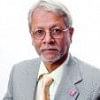Ekhon baazta hai ...
Down memory lane, and this I am going to do from time to time, as many readers of this page may not have read the pieces appearing in The Daily Star twenty years ago. Here goes a Chintito (item) that appeared under Pinch of Salt, Chintito's then banner head; the context is sadly not totally lost.
It is extremely impolite and improper to speak in anything but the native tongue or in a language not agreed upon between the communicating persons.
Picture this: You are walking on Oxford Street in London and a person of brown complexion but with distinct sub-continental features stops you quite abruptly and demands "Time kya hai?" meaning (perhaps), "What's the time?" The unsuspecting amongst us Bangalis will perhaps volunteer, "Ekhon baazta hai duita baiza ponero minit hota hai," (It's fifteen past two). It's ludicrous! The patriotic stance should be an absolutely blank look. Or, if you wanted to be polite you could beg his pardon in English because both of you were on English soil. And, if you chose to be both polite and patriotic, combine the blank look with a classical Bangali mind-boggler, "Aapnake theek chintey paarlam na," (Don't think I remember seeing you before).
Being brown and from India the British ruled, I could be from anywhere; from Peshawar to Panchagarh, from Goalondo to Goa. Well, if you want to bring the question of height, that's a dimension beyond any sensible confabulation. Again, being brown and short, I could be speaking in any of the languages that make this tanned subcontinent so much more colourful and vibrant. Actually, if this kya hai chap, who could be from anywhere north of Bangalore, used a bit of sense, he could have walked up to the Big Ben and looked up. The time is always there and you don't have to stop strangers and query in stranger languages.
An elderly Dhaka lady went to Bangkok for a check-up, accompanied by her son. She knew a bit of English but definitely no Thai. Next to the flat in which they put up, there was an elderly Thai lady who knew no English. One evening when the son returned home, he found his mother and the neighbour in perfect harmony. One was speaking in fluent Bangla and the other in flowing Thai; the old-timers were having a whale of a time. No language barrier there. Actually, what the two ladies did was the most sensible thing to do and nobody's feeling was hurt. That's the value of experience.
It is common knowledge that many Bangalis are rather charitable when it comes to speaking in a foreign lingua. Many a Dhaka trader will make idhar to udhar to strike a business deal with an Indian or a Pakistani counterpart. Why? If the chap on the other side can't understand Bangla, speak in English, recognised as a secondary language in both countries. And, if he can't decipher your English and if he is restricted by a handicap of 'yes, no, very good', take the cue from the elderly ladies; stick to your respective languages. If the business you are discussing is worth it, the deal you will strike will be better. Being equal, you will draw more respect from your overseas business friend.
It may be encouraging to remember that man has been trading from early times. For as long as one cares to remember, ships from bizarre lands have discovered virgin havens to trade their wares. Merchants have travelled many a month to stumble on exotic places. Never has language been a hindrance to business.
Use an interpreter. But, never let your counterpart have the upper hand by coaxing you to speak in his tongue in your own country. Your pride, your history, your very being should refrain you from doing that. Of course, when you are visiting him, you could always try and pick up his language. The principle should be to speak in your own tongue in your country and to try and speak the foreign tongue when you are abroad. And, today, there are always common third languages to choose from.
There was this Bangali doctor, volunteering for the PLO in Lebanon, using sign language to communicate on a complicated subject such as medicine with a Kashmiri, who had insisted that they parley in Urdu. The Bangali had the last say, without speaking a word.
Then there was this Bangladeshi student sitting in the office of the Bangladesh Association in Sheffield. Up comes this Pakistani and gives the Bangali a nudge from behind with a verbal 'khayriat?' query. The Bangali scholar was unmoved. After the third 'khayriat' poke, the Bangali swung around with a "Sorry?" The Pakistani was puzzled and inquired, "You don't understand Urdu?" The Bangali student could see 1952, 1969, 1971 flash by and replied "Urdu?" to let the poker know that even the word Urdu was unknown to him. The Pakistani does not give up and asks of the Bangali, "Are you Malaysian?" With glistening eyes, head held high, the Bangali replied, "No, Bangladeshi!"
The writer is a practising architect at Basha Bari Ltd., a Commonwealth Scholar and Fellow in the UK, a Baden-Powell Fellow Scout leader and a Major Donor Rotarian.

 For all latest news, follow The Daily Star's Google News channel.
For all latest news, follow The Daily Star's Google News channel. 



Comments